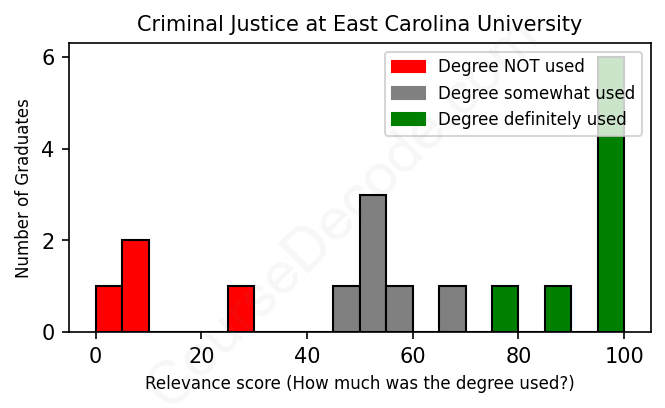
First, some facts. Of the Criminal Justice graduates from East Carolina University we've analyzed , here's how many have used (or NOT used) their degree in their career:

These are estimates based on AI analysis of 18 LinkedIn profiles (see below).
The verdict? Slightly below average. Overall, with an average relevance score of 62%, Criminal Justice graduates from East Carolina University have a slightly lower likelihood (-5%) of finding work in this field compared to the average graduate across all fields:
And for comparison, here's the chart for all profiles we've looked at across all degrees.
Also, after graduating, only 33% of these graduates have pursued further education other than another Bachelor's degree (such as a Masters degree or other), compared to the average across all profiles of 35%. This suggests a Bachelors degree is enough for most Criminal Justice graduates, and it's normal to look for work straight after graduation.
See the details:
|
Relevance score: 26% We think this person has NOT gone into a career related to their degree. We think this person has NOT gone into a career related to their degree.
DEGREE INFOGraduated in 2014 from East Carolina University with a Bachelor of Science in Criminal Justice in Criminal Justice. No other secondary education since. JOB HISTORY SINCE GRADUATIONIntern Court Counsler Division Of Juvenile Justice Aug 2014 - Dec 2014 Bankruptcy Officer Assistant  BB&T Nov 2015 - Oct 2018 Client Relations Specialist  New Direction Family Law Oct 2018 - Present Digital Marketer  Freelance Jun 2021 - Present ABOUTI am graduate of East Carolina University with a Bachelor of Science Degree in Criminal Justice. I am currently the Client Relations Specialist. I strive to advocate and provide guidance to clients during such a life changing time. I am dedicated to supporting and empowering families to achieve the future they deserve. I was previously a Bankruptcy Officer Assistant at BB&T and manage active bankruptcy cases, in all legal and banking aspects required. My time with Juvenile Justice along with BB&T has provided me with a wealth of experience with excellent customer service, case management, and the ability to work under strict timelines. I am a strong multitasker, able to handle multiple simultaneous legal and personal aspects of banking request accurately and completely. I believe the recipe to success in any part of your career is to maintain a positive mindset and have a professional approach! |
The top 10 most common jobs done by the graduates we've analyzed (ranked most common to least) are:
After checking out the career paths of East Carolina University graduates with a degree in Criminal Justice, it’s clear that many of them have followed a fairly traditional trajectory. The most common jobs include law enforcement roles like Police Officers, Deputy Sheriffs, and various positions within criminal justice institutions, such as Probation Officers and Bailiffs. These roles are highly relevant to their degree, as they directly apply the skills and knowledge gained during their studies, such as understanding legal procedures and working within the justice system. There’s definitely a strong link between their education and their jobs in these cases.
On the flip side, not every graduate seems to stick to the Criminal Justice field. Some have ventured into roles that don’t really relate—think project managers, administrative assistants, or even marketing positions. These jobs don't require the unique expertise from a Criminal Justice degree, making them less relevant. So, while a solid number of graduates found work that closely ties back to their studies, there’s also a noticeable chunk who took a different path, often leading them away from traditional roles connected to Criminal Justice. This mix highlights the versatility of the degree but also raises questions about how well it prepares graduates for varied career options outside of law enforcement or legal roles.
Here is a visual representation of the most common words in job titles for Criminal Justice graduates (this is across all Criminal Justice graduates we've analyzed, not just those who went to East Carolina University):

When we look at the career paths of East Carolina University graduates who studied Criminal Justice, we mostly see that they're diving right into jobs that are pretty relevant to the field. Right after graduation, many of them are starting positions like police officers, probation officers, and other roles in law enforcement or public safety. For example, graduates from 2010 and 2011 quickly transitioned into various law enforcement positions, such as deputy sheriffs and police officers, which is great to see because it shows they’re utilizing their degrees well. Many of them appear to be sticking with the field, with numerous individuals having climbed the ranks in law enforcement up to positions like sergeant and lieutenant within a few years. This suggests that the Criminal Justice program at ECU prepares students to enter the workforce effectively and advance over time.
However, it's not all law enforcement for everyone. Some graduates shifted gears into roles that are somewhat outside the typical Criminal Justice trajectory, like project management, outside sales, or even social media research. In the longer term (5 to 10 years after graduation), while many graduates remain in or return to relevant fields, it's clear that some have found success in completely different industries, which could indicate that a Criminal Justice degree provides versatile skills. For instance, one graduate transitioned from police work to managing at a production company, while another went from law enforcement to digital marketing. So, while the foundation in Criminal Justice sets many on a clear path in law enforcement, others have creatively navigated to different careers, proving that this degree has broader applications than one might expect.
Getting a Bachelor’s degree in Criminal Justice, whether at East Carolina University or anywhere else, is generally considered to be more on the manageable side compared to some other majors. While you'll definitely have to grapple with some challenging topics, like law, ethics, and psychology, many students find that the coursework is pretty straightforward, especially if you stay organized and keep up with your readings. Plus, the professors often bring a lot of real-world experience into the classroom, which can make the material more engaging. So, if you have a genuine interest in the subject, you'll probably find it easier to handle than, say, an engineering or physics degree. Just stay motivated and ask for help when you need it, and you should be good to go!
Most commonly, in the LinkedIn profiles we've looked at, it takes people 4 years to finish a Bachelor degree in Criminal Justice.
Looking at the career paths of these East Carolina University Criminal Justice grads, it seems like their earnings could be pretty mixed. Many of them started in lower-paying roles like bailiffs or police officers, which typically don't have sky-high salaries, especially at the entry level. Over time, some moved up to higher positions, like a Lieutenant or a Police Officer, which pay better, and it looks like a few have ventured into roles in administration or research, like the grads who became program managers or operations directors—those jobs can bring in a decent income. However, not everyone seems to have made the jump to really good-paying positions, and there are quite a few still in entry-level or support roles. So, while some are likely doing well for themselves now, others might still be working their way up the ladder. It’s a bit of a mixed bag overall!
Here is a visual representation of the most common words seen in the "about" section of LinkedIn profiles who have a Bachelor degree in Criminal Justice (this is across all Criminal Justice graduates we've analyzed, not just those who went to East Carolina University). This may or may not be useful:

Here are all colleges offering a Bachelor degree in Criminal Justice (ordered by the average relevance score of their Criminal Justice graduates, best to worst) where we have analyzed at least 10 of their graduates: